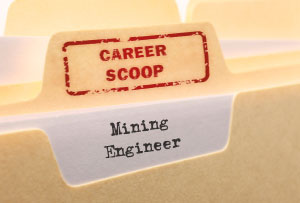 In a nutshell, what do you do?
In a nutshell, what do you do?
A mining engineer is to a mine what an architect is for a house, or a conductor for an orchestra. Mining engineers design pits and roads to access the ore in 3 dimensions using sophisticated software. We also sequence the different parts of the mine to make sure that we always have the right material available at the right time.
Mining engineers also estimate the cost for mining and often assess how much profit the mine is going to make every month or year.
On site, mining engineers focus on making sure that the mining fleet is operating as efficiently as possible. Mining engineers also look after the explosives on site to make sure that they are used in accordance with regulations.
On the corporate side, mining engineers ‘sign-off’ on all company public releases for Ore Reserves.
Why did you choose this career?
It was a career choice that offered 3 key benefits: good salary, a high chance of employment and travel opportunities.
What path did you take into it?
I went to a regular high school and enjoyed maths and science. I then went on to study Engineering at university with a common first year, and specialised in Mining from Year 2-4.
What, in your opinion, is the best bit of being a mining engineer?
It’s a fascinating field with practical, hands-on experience. Mining engineers tend to be given a lot of responsibility early on in their careers.
Being a mining engineer involves having a varied skill set – some chemistry, physics, financial modelling skills and general project management skills are what makes a good mining engineer.
Every job has its downsides. What do you think are the worst bits?
Some people don’t like the remote work. You can’t be a mining engineer without spending at least 5-10 years ‘out bush’. For some people, this is a major turn off. For others it’s a unique opportunity to see parts of Australia – or the world – that you wouldn’t otherwise have seen.
Is it what you expected when you first started out?
Yes, I got into mining as a young Canadian and have now been living in Australia for 14 years. I have worked and travelled in New Caledonia, Mongolia, Ivory Coast, Indonesia, Solomon Islands, The Philippines and many more.
What do the public least understand – or mistake – about what you do?
People think that mining is dangerous, unsustainable and harms the environment. Mining practices have changed significantly over the past 2-3 decades and improvements are always being made in mine safety and environmental management.
The fact is that mining has an important place in today’s world. If you can’t grow it, you have to mine it.
What kind of people tend to do well in this kind of career?
To be a good mining engineer, you tend to have to be a generalist (ie interested in a wide variety of issues; technical, managerial and business skills are useful).
As a mining engineer, you can become a technical specialist dealing with 3D block models and mine planning systems or you can become part of the mine management team, typically on site, and leading teams of 200-300 operators.
Finally, any advice you’d offer to people looking to get into this line of work?
Before you study mining engineering, be sure that you are willing to head ‘out bush’ for at least 5-10 years. It will change your life, especially if you have grown up in the city.
A mining engineer can specialise into a variety of roles and environments including:
- Open cut metals – technical specialist or mine management
- Open cut coal – technical specialist or mine management
- Underground metals – technical specialist or mine management
- Underground coal – technical specialist or mine management
- Be part of the mining investment/lending division of a bank



